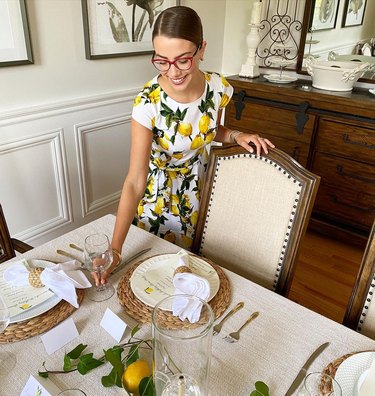
Every holiday season, etiquette expert Mariah Grumet gets asked a lot of questions: "What should I bring to my boss's Christmas party?" "How do I respond to relatives asking about my love life?" "Do I have to give everyone in my extended family a gift?"
Luckily, Mariah, founder of Old Soul Etiquette, has all the answers, ready to help during the time of year when we're forced to vacate our couches, set down our phones and interact with people IRL. Her bubbly, poised TikToks and Instagram posts—in which she dispenses quick tips—have earned her nearly 200K followers. "At a time when we communicate so much virtually, we're losing the art of being able to connect with people in person and to work to present ourselves well," Mariah says. "People need etiquette more than ever, and the holidays are such an important time for it. We want to put others before ourselves, make people feel valued and comfortable in our presence and gain a sense of preparation so we can feel confident navigating different social situations."
Video of the Day

If you're like us, you've got a few burning questions about seasonal etiquette. To garner advice ahead of seasonal gatherings, we spoke to Mariah about avoiding common host and guest pitfalls, navigating awkward office parties and how to thrive (not just survive!) in social settings this holiday season.
Let's start with the question on everyone's mind: What should guests bring to a holiday party?
MARIAH: When you receive an invitation, that's when you ask a host, "Can I bring anything?" If your host replies no, respect their wishes. Don't bring a side dish or drink you weren't asked to bring. This is a heated debate because people have good intentions—and I don't want to belittle that—but your host worked really diligently to create a beautiful party. If they have a theme or certain menu they're working with, your dish will throw them off and they may feel obligated to serve it.
That doesn’t mean that you should show up completely empty-handed, right?
MARIAH: No. Bring a gift that the host can enjoy at a later time. My recommendation is always small cocktail napkins for later use—paper ones if it's a casual gathering; linen ones with embroidered initials for a more formal party. Or, if you know that this person loves food, you can give them something to enjoy for breakfast the next morning. Flowers are also lovely. Just be sure that they're already in a vase of water, because if a bouquet is wrapped in plastic, your host has to pause what they're doing to set it up. You don't want to give your host more work!
What are your definitions of a "good host" and a "good guest"?
MARIAH: A good host is someone who is present. They've done as much as they can in advance so they can really be available for guests. The aim is to have guests leave your home happier than they arrived. A good guest is flexible and adapts. You are now entering someone else's space, with different customs and different ways of doing things. If you're an overnight guest, remember to clean up after yourself!
What is the etiquette around asking people to take off their shoes in your home? That’s becoming a more common practice.
MARIAH: It's perfectly acceptable to put it in the invitation if you're hosting. Or, as people come in, say, "Would you please remove your shoes?" and have new socks, slippers or shoe covers handy for people who might not have been prepared. Guests should be prepared to comply with taking off their shoes—people ban shoes for health and cultural reasons, so respect that. If you have a medical condition and cannot walk around barefoot, have a pair of shoes handy that are for indoor use only.
And don’t wear your stinkiest shoes!
MARIAH: Yes, exactly. Be prepared!
How do we keep the conversation flowing at a party, even if we don’t know anyone there?
MARIAH: It starts with the host. When you invite people to your home, you may have people from different circles who don't know each other. So you want to introduce people to each other and get the conversation started. You know something about both of these people, so use that to connect them with each other! It sounds silly, but before I go to an event as a guest, I jot down conversation topics like a recent trip I took, a new restaurant I tried or something fun that happened. That way, I have a list of interesting things in the front of my brain and I'm not completely blank when someone asks me a question.

Should people avoid certain topics at parties?
MARIAH: You want to stay away from anything that might spark an issue: money, health, politics and religion—though I always say that it depends on who you're with. If it's your closest friends and family, your conversation topics are going to look a lot different than if you're at your neighbor's party, where you don't know many people.
Dining Etiquette 101
It may well be the question that etiquette expert Mariah Grumet receives the most: What are the must-follow rules for table etiquette? Here are her top tips:
Don’t put the napkin on your lap until your host does. “It’s a sign of respect,” Mariah says. “Allow your host to finish what they’re doing, and when they put their napkin on their lap, you do too.”
Serve others before yourself. “If you’re eating family style, always offer to serve the person to your left first, then serve yourself and pass to the right,” Mariah says.
Be careful with glassware. “At holidays, people are bringing out their best china,” Mariah advises. “Make sure to hold glassware by the stem to avoid fingerprints and avoid warming the beverage.”
Say no to cell phones. “Cell phones at the table block conversation and show disinterest. We don’t want them anywhere to be found,” Mariah says. “They should be put on silent. If you're a parent or caretaker, and someone needs to reach you in case of an emergency, just put it on vibrate on your lap. At a smaller table, tell the others that you may have to get up for an emergency call; at a bigger table, tell the person next to you. That way, if you get up abruptly, people are not left wondering."
Holidays mean family members who feel totally entitled to pry into your personal life. Do you have a universal response for nosy questions?
MARIAH: I have a universal response for anything that has to do with the progression of your life, like "When are you having kids?" or "Getting married?" or "Do you have a boyfriend?" It's simple to say—and the tone depends on your relationship with the person—"I'm just really enjoying this season of my life right now. I'll let you know when I figure it out." It puts a positive spin on it. The people who ask these personal questions are really looking for a reaction. Giving no reaction and focusing on the positive might trick them a bit.
What about hurtful comments about weight, appearance or how much you’re eating?
MARIAH: I would still reply with kindness and positivity because that's not what they're expecting. They're wanting you to be defensive and reactive. So when someone asks why you're eating so much, reply by saying something like "Because it's good—why wouldn't I?" They're not expecting humor.
That being said, I'm also a big proponent of putting up boundaries. If an unkind comment is coming from someone you have an issue with, it's fine to say, "You know it really hurts my feelings when you say something like that, and I don't want to talk about it." Then start talking to someone else.
On the topic of family holiday etiquette, should we feel compelled to buy gifts for every cousin, aunt and in-law? There can be a lot of pressure to do so, especially when extended family spend holidays together.
MARIAH: No. Set your own budget early on, taking into consideration where you are financially and what you're able to do, then really be okay with that. You may only be able to give a homemade gift this year, and that's fine. Setting your own expectations is important, as is not feeling bad if someone gave you something and you don't have a gift in return. Place the focus on your gratitude, celebrating the gift that they bought you.

If you’re hosting, how do you signal to people that it’s time to go home?
MARIAH: I don't know if you've seen these signs people have in their homes that say, "Please leave by 9." Those are my favorite! But seriously, you want to have a clear transition period. Whether that means moving from dinner to dessert, or dessert to after-dinner drinks, or tea and coffee. That's the first step. The second is to start recapping the evening: "It was so funny when so-and-so said this"; "the dessert that so-and-so brought was delicious." You can also move people to the next room, dim the lights, lower the music…change the environment a little bit to show that there's a clear transition. People don't always get the hint, but it gets people moving. You can also put the end time on the invitation.
What’s your best rule for office parties?
MARIAH: Remember that although it's a party, you're representing a team and you have a professional reputation to uphold. It's a time to connect with your coworkers, but this is still your professional arena. You want to have fun but keep your composure—and know your limits with alcohol.
Okay, you've given us so many great tips for attending holiday gatherings. But how do you politely say "no" to an invite?
MARIAH: This is an expensive and busy time of the year, so you can't say yes to everything because you will burn out. Don't overexplain. RSVP "no" as soon as possible. You don't have to be long-winded about why! You can say you have a prior commitment or are unavailable that day, but you don't have to give your whole life story. If it's a close friend who might be worried about you, you can give a reason privately. Wish them a wonderful time, perhaps propose another time to get together and consider sending a small gift or flowers in your absence to wish them a good party.
With Mariah's advice in mind and good intentions in your heart, you're sure to enjoy a holiday season that's full of pleasant conversation, healthy boundaries and plenty of cheer.
